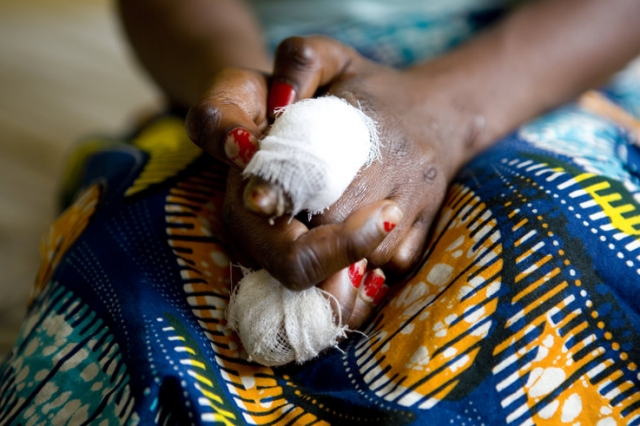Sexual and intimate partner violence affects millions in Africa
 Brazzaville, 5 January 2015 – In the African Region, one in five girls have been sexually abused during childhood, with estimates from some countries placing that proportion closer to one in three. This startling statistic is highlighted in the newly released Global status report on violence prevention 2014.
Brazzaville, 5 January 2015 – In the African Region, one in five girls have been sexually abused during childhood, with estimates from some countries placing that proportion closer to one in three. This startling statistic is highlighted in the newly released Global status report on violence prevention 2014.
The report – the first of its kind – features data collected from 27 countries in the African Region and around the world. It highlights some of the key strategies for preventing sexual and intimate partner violence by promoting gender equity, creating a climate of non-tolerance for violence, and starting prevention efforts at a young age.
According to the report, intimate partner violence is a significant social and public health problem affecting 36.6% of ever-partnered women in the African Region.
This violence can lead to unintended pregnancies, unsafe abortions, reproductive health problems, and sexually transmitted infections, such as HIV and syphilis – all conditions undermining progress toward the 2015 Millennium Development Goals (MDGs).
Violence is also associated with other leading causes of death such as heart disease, stroke, cancer and HIV/AIDS as a result of victims adopting behaviours such as smoking, alcohol and drug misuse, and unsafe sex in an effort to cope with the psychological impact of violence.
Despite strong evidence linking experiences of violence to mental health problems, only 15% of countries in African Region reported the availability of mental health services to address the needs of victims. This demonstrates a critical gap that needs to be filled in health systems throughout the Region.
“There is no simple or single solution to the problem of violence but there is a growing body of knowledge on how to prevent violence. Countries are investing in prevention programmes but they are not being implemented in a manner or on a level that is necessary to achieve significant and sustainable reductions in violence,” said Dr Luís Sambo, WHO Regional Director for Africa.
The problem of violence in Africa, highlighted in the African Health Report 2014 and the Global status report on violence 2014 highlights the need to include several violence prevention goals in the post-2015 development agenda. These include halving violence-related deaths everywhere, ending violence against children, and eliminating all forms of violence against women and girls by 2030.
One WHO recommendation is to integrate known violence prevention strategies into pre-existing health platforms. This is because violence is a risk factor in many health outcomes such as HIV and sexually transmitted diseases, mental health and substance abuse disorders, and many of these platforms may already exist.
Violence of all types is strongly associated with social determinants of health and cross-cutting risk factors such as excessive use of alcohol. Proven measures to reduce the harmful use of alcohol include restrictions on the sale and serving of alcohol – for example, through excise taxes on beer, wine and spirits, reduced hours or days of sale of alcoholic beverages, minimum age for the purchase of alcohol, and other industry regulations.
In many countries, knowledge about the true extent of sexual and intimate partner violence is hindered by lack of data. Without such data it is difficult to develop effective national plans of action, policies, prevention programmes and services for victims.
The Global status report on violence prevention 2014 is available at: Global status report on violence prevention 2014
______________________________________________
For more information, please contact:
Technical contacts:
Dr Sebastiana Nkomo
Tel: +472 413 9722
Email: nkomos [at] who.int (nkomos[at]who[dot]int)
Dr Daisy Trovoadad
Tel: +472 413 9384
Email: trovoadad [at] who.int (trovoadad[at]who[dot]int)
Media contacts:
Dr Cory Couillard
Tel: + 472 413 9995
E-mail: couillardc [at] who.int (couillardc[at]who[dot]int)
Collins Boakye-Agyemang
Tel: + 472 413 9420
E-mail: boakyeagyemangc [at] who.int (boakyeagyemangc[at]who[dot]int)
Communications and marketing officer
Tel: + 242 06 520 65 65 (WhatsApp)
Email: boakyeagyemangc [at] who.int (boakyeagyemangc[at]who[dot]int)


